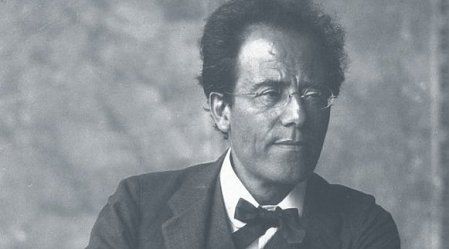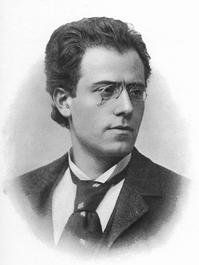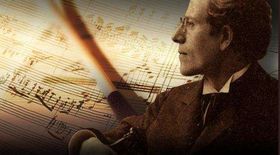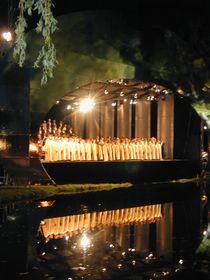
 Mahler's native house in Kaliště
One of the most significant composers of modern times, Gustav Mahler, was born on July 7, 1860, in Kaliště near the eastern town of Jihlava where he grew up. Bohemia was then part of the Austro-Hungarian Empire, the Mahler family belonged to a German-speaking minority among Bohemians, and was also Jewish. From this background the future composer developed early on a permanent sense of exile, as he said "always an intruder, never welcomed".
Mahler's native house in Kaliště
One of the most significant composers of modern times, Gustav Mahler, was born on July 7, 1860, in Kaliště near the eastern town of Jihlava where he grew up. Bohemia was then part of the Austro-Hungarian Empire, the Mahler family belonged to a German-speaking minority among Bohemians, and was also Jewish. From this background the future composer developed early on a permanent sense of exile, as he said "always an intruder, never welcomed".
 Gustav Mahler
Mahler showed his musical gifts at an early age. After graduating from the Vienna Conservatory in 1878, he held a succession of conducting posts of rising importance in the opera houses of Europe, culminating in his appointment in 1897 as director of the Vienna Court Opera (Hofoper). During his ten years in Vienna, Mahler, who had converted to Catholicism from Judaism to secure the post, experienced regular opposition and hostility from the anti-Semitic press. Nevertheless, his innovative productions and insistence on the highest performance standards ensured his reputation as one of the greatest of opera conductors, particularly as an interpreter of the stage works of Wagner and Mozart. Late in his life he was briefly director of New York's Metropolitan Opera and the New York Philharmonic.
Gustav Mahler
Mahler showed his musical gifts at an early age. After graduating from the Vienna Conservatory in 1878, he held a succession of conducting posts of rising importance in the opera houses of Europe, culminating in his appointment in 1897 as director of the Vienna Court Opera (Hofoper). During his ten years in Vienna, Mahler, who had converted to Catholicism from Judaism to secure the post, experienced regular opposition and hostility from the anti-Semitic press. Nevertheless, his innovative productions and insistence on the highest performance standards ensured his reputation as one of the greatest of opera conductors, particularly as an interpreter of the stage works of Wagner and Mozart. Late in his life he was briefly director of New York's Metropolitan Opera and the New York Philharmonic.
 Mahler's œuvre is relatively small - for much of his life composing was a part-time activity, secondary to conducting - and is confined to the genres of symphony and song, except for one piano quartet. Most of his ten symphonies are very large-scale works, several of which employ soloists and choirs in addition to augmented orchestral forces. These works were often controversial when first performed, and were slow to receive critical and popular approval; an exception was the triumphant premiere of his Eighth Symphony in 1910. Mahler's immediate musical successors were the composers of the Second Viennese School, notably Arnold Schoenberg, Alban Berg and Anton Webern. Shostakovich and Benjamin Britten are among later 20th-century composers who admired and were influenced by Mahler.
Mahler's œuvre is relatively small - for much of his life composing was a part-time activity, secondary to conducting - and is confined to the genres of symphony and song, except for one piano quartet. Most of his ten symphonies are very large-scale works, several of which employ soloists and choirs in addition to augmented orchestral forces. These works were often controversial when first performed, and were slow to receive critical and popular approval; an exception was the triumphant premiere of his Eighth Symphony in 1910. Mahler's immediate musical successors were the composers of the Second Viennese School, notably Arnold Schoenberg, Alban Berg and Anton Webern. Shostakovich and Benjamin Britten are among later 20th-century composers who admired and were influenced by Mahler.
 International Gustav Mahler Society, founded in Vienna in 1955
International Gustav Mahler Society, founded in Vienna in 1955